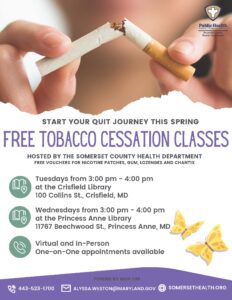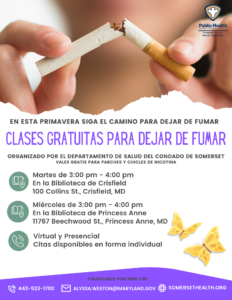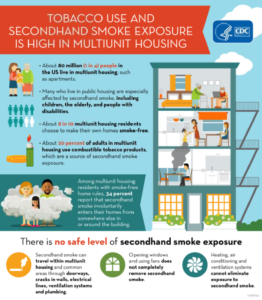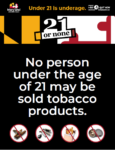are you interested in quitting tobacco smoking or vaping?
join our free tobacco cessation classes!
smoking harms nearly every organ in the body
Smoking leads to disease and disability and harms nearly every organ of the body. More than 16 million Americans are living with a disease caused by smoking. For every person who dies because of smoking, at least 30 people live with a serious smoking-related illness.
Smoking causes cancer, heart disease, stroke, lung diseases, diabetes, and chronic obstructive pulmonary disease (COPD), which includes emphysema and chronic bronchitis. Smoking also increases risk for tuberculosis, certain eye diseases, and problems of the immune system, including rheumatoid arthritis.
secondhand smoke
Exposure to secondhand smoke, even for a short time, can be harmful to both children and adults.
- Secondhand smoke can cause health problems in children and adults, and can even be deadly.
- Since 1964, about 2,500,000 people who do not smoke have died from health problems caused by secondhand smoke exposure.
How Secondhand Smoke Harms Adults
- Even if you have never smoked, secondhand smoke can still cause:
- Heart disease
- Lung cancer
- Stroke
Even brief exposure to secondhand smoke can be harmful to your heart and blood vessels.
How Secondhand Smoke Harms Children
- Because their bodies are still growing, infants and young children are especially vulnerable to health risks from secondhand smoke.
- Babies who breathe secondhand smoke are more likely to die unexpectedly from sudden infant death syndrome (SIDS), also called crib death, than babies who are not exposed to smoke from burning tobacco products.
- Babies exposed to secondhand smoke in the womb or after birth are born and grow up with weaker lungs than babies that are not exposed to secondhand smoke.
- Babies and children who breathe secondhand smoke are sick more often with bronchitis, pneumonia, and ear infections than those that are not exposed to secondhand smoke.
- For children with asthma, breathing secondhand smoke can trigger an asthma attack.
can’t hide smoke in the home
- Smoking in another room like a bathroom or bedroom can still spread secondhand smoke through the air in your home. In an apartment building, secondhand smoke can go in between apartments.
- Smoking outside in a hall or stairwell does not protect children inside. Smoke goes under doors, windows, and through cracks.
- Opening a window or using a fan does not protect children from secondhand smoke.
- Air purifiers and air fresheners do not remove secondhand smoke.
- Smoke from one cigarette can stay in a room for hours. Don’t smoke at home, even when children aren’t there.
- Separating people who smoke from those who don’t smoke, cleaning the air and ventilating buildings does not fully protect children or adults from secondhand smoke.
Maryland’s quitline
 The Maryland Tobacco Quitline is a FREE service for Marylanders provided by the Department of Health.
The Maryland Tobacco Quitline is a FREE service for Marylanders provided by the Department of Health.
Get 24-7 counseling and support consisting of telephone sessions with a trained quit coach, nicotine replacement therapy (4 weeks free of patch or gum to eligible clients), web based services, recorded messages, texts, and/or literature.
Coaches provide quitting tips and techniques, and help participants create a personalized quit plan.
Special services are available to teens and to pregnant women. Services are also available in Spanish.
Visit Maryland Tobacco Quitline for more information, or call 1-800-QUITNOW (1-800-784-8669) or 1-855-DEJELO-YA (1-855-335-3569).
IT’S THE LAW.
The minimum sales age for all tobacco products in Maryland is 21 (“T21”).
This includes sales of all electronic smoking devices: e-cigarettes, vapes, pod devices such as JUUL®, e-liquids, and component parts and accessories.




